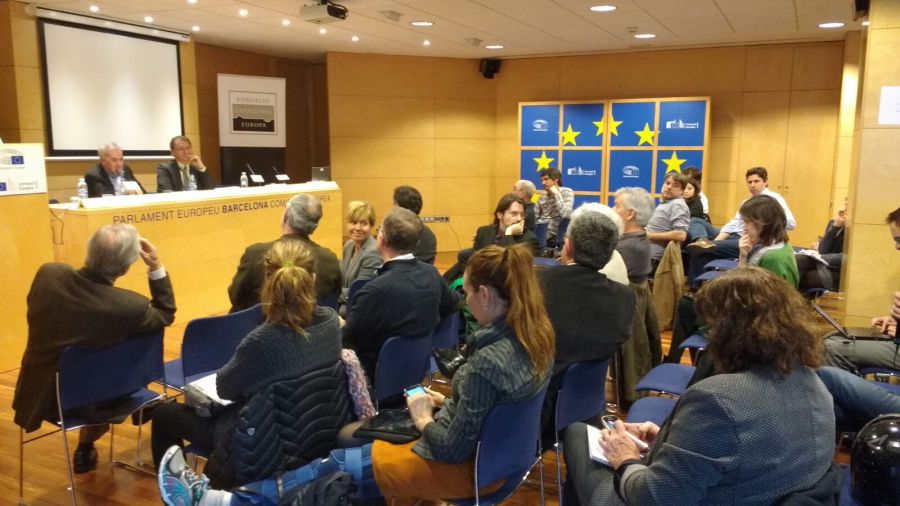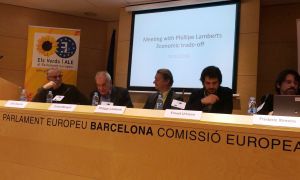The speakers of the debate "More Europe, More Green" call for a Fiscal Union to ensure the future of the EU. They also believe that the Union should lead the transition to an emissions-free economy.
"Retiring to national borders is not the answer, some play with fear, but there is no wall that can protect us from the world's ills, our hope is to confront them with democracy [and in Europe]". For Philippe Lamberts, co-chairman of the Greens / European Free Alliance group in the European Parliament, the only way to respond to the crisis - economic, environmental, refugees - of the continent is to deepen European integration, and democratization of the EU Community institutions should also stimulate the transition towards an emissions-free economy. These are some of the ideas that Lamberts put on the table yesterday the debate "More Europe, More Green", organized by the Catalunya Europa Foundation and the group Greens / European Free Alliance.
The debate, held at the Representation of the European Commission in Barcelona, ??was attended by Ernest Maragall and Ernest Urtasun, members of the Parliamentary Group of the Greens. Jordi Angusto, economist and advisor of the Foundation, also participated; and Frederic Ximeno, biologist and director of business development at the Ramon Folch Studio. MEPs warned against the risks facing the Union. One of them, Maragall said, is to "act in an unsound manner", offering short-term solutions for problems that require long-term responses, such as climate change. Another, related to the previous one, is the legitimacy of the community project. "The other day I was on the radio, and someone asked me if we needed more or less Europe, the European conscience is at stake", warned Urtasun.
The legitimacy of the community project is at stake for the functioning of the Monetary Union, said Angusto. With the beginning of the crisis, the response of the community institutions went through a policy of generalized austerity. This served to increase the competitiveness of southern Europe where, unlike Germany, wages had increased. Such policy, however, was not accompanied by investments in countries where the deficit is smaller, such as "Holland and Germany". Actions that could have broken with the vicious circle between layoffs, low demand, lower investments and rising unemployment. The consequence is "a race to the bottom, a scenario where nobody wants to invest and the result is a global recession". The conclusion is clear, for Angusto: "Without a Fiscal Union, the Monetary Union will not work".
How can the Fiscal Union be put into practice? For Lamberts, the key is to show citizens that "national sovereignty does not work" when it comes to responding to the problems facing European countries. According to the MEP, examples such as Ikea "are the case" that the current challenges must be addressed at the EU level: "[With the Country-by-Country Reporting, the obligation of companies to report on the activities carried out in each country of the Union] we know the benefits that companies obtain regardless of their accounting, if we apply it, with a minimum tax of 25%, they will only have two options: either comply with the common rules or leave. Your sales from Europe will come out? I do not think so. "The evidence, therefore, supports greater integration. And citizens are prepared to accept it. The key is to "lead" and convince the population. Move away from the populist temptation that has grown, explained the MEP, for the "political elections" that favored, since the 1980s, the reduction of the Welfare State and impoverished people.
The role of the Union is also key to promoting the energy transition, said Lamberts. Even more so when, according to the biologist Frederic Ximeno, the market mechanisms are not driving it: "The EU predicted that the price of oil would grow to reach 100 dollars per barrel, then green energies would become competitive. It's like that, it's at $ 40, and the future is uncertain. "The automotive industry, which has opted for emissions fraud, and the European Parliament's response, which "has weakened emission targets", are another example. As is the low efficiency of the energy efficiency directive, as it is not binding.
Given this background, Lamberts put the European Union in the center of the board. Community rules must be linked, if they want to have any effect. And community investment programs can help consolidate an economy that leaves behind the use of fossil fuels and commits to energy efficiency. But for this, investment instruments such as the Juncker Plan must be reformed so that they prioritize "the energy transition", leaving other projects -such as financing schools- in state hands. "State intervention has allowed China to do more value-added activities, and the market alone will not make the energy transition", said the MEP, who said investments in renewable energy could help in southern Europe: "Imagine that Greece could be an exporter of renewable energy, it would change its balance".
The Community Institutions, consequently, must press to leave the industries based on fossil fuels behind, at the same time as they help the reconversion of their employees. "You have to give solutions to coal workers, but you have to invest in renewables", summed up Lamberts, who criticized the role of traditional formations: "The European People's Party and part of the Socialists defend polluting companies, which seek rents to short term".
Yanis Varoufakis, a possible ally
During the debate, Lamberts pointed out that the Democracy in Europe 2025 initiative led by Yanis Varoufakis "obviates that a majority [of Europeans] supports the EU Institutions". A condition that remains to be seen if it is met. And he offered his hand to the former Greek finance minister to work together: "I think Varoufakis and I have common enemies in Europe, supporters of the status quo would be delighted to see us divided".










